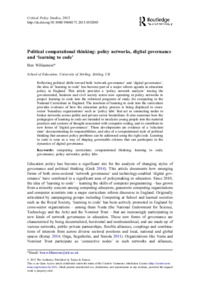Political computational thinkingpolicy networks, digital governance and ‘learning to code’
Publikationsdatum:
|
 |
 Diese Seite wurde seit 2 Jahren inhaltlich nicht mehr aktualisiert.
Unter Umständen ist sie nicht mehr aktuell.
Diese Seite wurde seit 2 Jahren inhaltlich nicht mehr aktualisiert.
Unter Umständen ist sie nicht mehr aktuell.
 Zusammenfassungen
Zusammenfassungen
Political computational thinking is a style of thought, then, that aims to
translate social phenomena into computational models that can then be solved by being
formalized as step-by-step algorithmic procedures that can be computed as proxies for
human judgment or action.
Von Ben Williamson im Text Political computational thinking (2015) Reflecting political shifts toward both ‘network governance’ and ‘digital governance’,
the idea of ‘learning to code’ has become part of a major reform agenda in education
policy in England. This article provides a ‘policy network analysis’ tracing the
governmental, business and civil society actors now operating in policy networks to
project learning to code into the reformed programs of study for computing in the
National Curriculum in England. The insertion of learning to code into the curriculum
provides evidence of how the education policy process is being displaced to crosssector
‘boundary organizations’ such as ‘policy labs’ that act as connecting nodes to
broker networks across public and private sector borderlines. It also examines how the
pedagogies of learning to code are intended to inculcate young people into the material
practices and systems of thought associated with computer coding, and to contribute to
new forms of ‘digital governance’. These developments are evidence of a ‘reluctant
state’ deconcentrating its responsibilities, and also of a computational style of political
thinking that assumes policy problems can be addressed using the right code. Learning
to code is seen as a way of shaping governable citizens that can participate in the
dynamics of digital governance.
Von Ben Williamson im Text Political computational thinking (2015)  Dieser wissenschaftliche Zeitschriftenartikel erwähnt ...
Dieser wissenschaftliche Zeitschriftenartikel erwähnt ...
 Personen KB IB clear | Martin Dodge , Carl Benedikt Frey , Alex Hope , Rob Kitchin , Ian Livingstone , Michael A. Osborne , The Royal Society | ||||||||||||||||||||||||||||||||||||
 Begriffe KB IB clear | Bildungeducation (Bildung)
, Bildungspolitikeducation politics
, computational thinkingcomputational thinking
, Curriculum / Lehrplancurriculum
,  Digitalisierung
, Digitalisierung
,  Gesellschaft Gesellschaft society
, Informatikcomputer science
, Informatik-Unterricht (Fachinformatik)Computer Science Education
, society
, Informatikcomputer science
, Informatik-Unterricht (Fachinformatik)Computer Science Education
,  Politik Politik politics
, politics
,  Programmieren Programmieren programming programming
| ||||||||||||||||||||||||||||||||||||
 Bücher |
| ||||||||||||||||||||||||||||||||||||
 Texte |
|
 Dieser wissenschaftliche Zeitschriftenartikel erwähnt vermutlich nicht ...
Dieser wissenschaftliche Zeitschriftenartikel erwähnt vermutlich nicht ... 
 Nicht erwähnte Begriffe | Informatik-Didaktik, Informatikunterricht in der Schule, LehrerIn, Lehrplan 21, Lernen, Schule, Schweiz, Unterricht |
 Tagcloud
Tagcloud
 Zitationsgraph
Zitationsgraph
 Zitationsgraph (Beta-Test mit vis.js)
Zitationsgraph (Beta-Test mit vis.js)
 Zeitleiste
Zeitleiste
 7 Erwähnungen
7 Erwähnungen 
- Big Data in Education - The digital future of learning, policy and practice (Ben Williamson) (2017)

- Art education in the post-digital era - Experiential construction of knowledge through creative coding (Tomi Slotte Dufva) (2018)


- Metaphors of code - Structuring and broadening the discussion on teaching children to code (Tomi Slotte Dufva, Mikko Dufva) (2016)


- Metaphors of code - Structuring and broadening the discussion on teaching children to code (Tomi Slotte Dufva, Mikko Dufva) (2016)
- Education Policy, Digital Disruption And The Future Of Work - Framing Young People’s Futures In The Present (Shane B. Duggan) (2019)

- Proceedings of the 14th Workshop in Primary and Secondary Computing Education, WiPSCE 2019, Glasgow, Scotland, UK, October 23-25, 2019 (2019)
- Cognitive Correlates of Computational Thinking - Evaluation of a Blended Unplugged/Plugged-In Course (Katerina Tsarava, Luzia Leifheit, Manuel Ninaus, Marcos Román-González, Martin V. Butz, Jessika Golle, Ulrich Trautwein, Korbinian Moeller) (2019)


- Cognitive Correlates of Computational Thinking - Evaluation of a Blended Unplugged/Plugged-In Course (Katerina Tsarava, Luzia Leifheit, Manuel Ninaus, Marcos Román-González, Martin V. Butz, Jessika Golle, Ulrich Trautwein, Korbinian Moeller) (2019)
- Post-Digital, Post-Internet Art and Education - The Future is All-Over (Kevin Tavin, Gila Kolb, Juuso Tervo) (2021)


- 16. Creative Coding as Compost(ing) (Tomi Slotte Dufva)


- 16. Creative Coding as Compost(ing) (Tomi Slotte Dufva)
- WiPSCE '21 - The 16th Workshop in Primary and Secondary Computing Education, Virtual Event / Erlangen, Germany, October 18-20, 2021 (Marc Berges, Andraes Mühling, Michal Armoni) (2021)
- Investigating Creative and Critical Engagement with Computing in the Hour of Code - (Practical Report) (Luis Morales-Navarro, Yasmin B. Kafai, Gayithri Jayathirtha, Mia S. Shaw) (2021)


- Investigating Creative and Critical Engagement with Computing in the Hour of Code - (Practical Report) (Luis Morales-Navarro, Yasmin B. Kafai, Gayithri Jayathirtha, Mia S. Shaw) (2021)
- Past, Present and Future of Computing Education Research (Mikko Apiola, Sonsoles López-Pernas, Mohammed Saqr) (2023)


- Capturing the Impact and the Chatter Around Computing Education Research Beyond Academia in Social Media, Patents, and Blogs (Mohammed Saqr, Sonsoles López-Pernas, Mikko Apiola)


- Capturing the Impact and the Chatter Around Computing Education Research Beyond Academia in Social Media, Patents, and Blogs (Mohammed Saqr, Sonsoles López-Pernas, Mikko Apiola)
 Anderswo finden
Anderswo finden
 Volltext dieses Dokuments
Volltext dieses Dokuments
 |  Political computational thinking: Artikel als Volltext ( Political computational thinking: Artikel als Volltext ( : :  , 423 kByte; , 423 kByte;  : :  2020-11-28) 2020-11-28) |
 Anderswo suchen
Anderswo suchen 
 Beat und dieser wissenschaftliche Zeitschriftenartikel
Beat und dieser wissenschaftliche Zeitschriftenartikel
Beat hat Dieser wissenschaftliche Zeitschriftenartikel während seiner Zeit am Institut für Medien und Schule (IMS) ins Biblionetz aufgenommen. Beat besitzt kein physisches, aber ein digitales Exemplar. Eine digitale Version ist auf dem Internet verfügbar (s.o.). Es gibt bisher nur wenige Objekte im Biblionetz, die dieses Werk zitieren.












 Biblionetz-History
Biblionetz-History